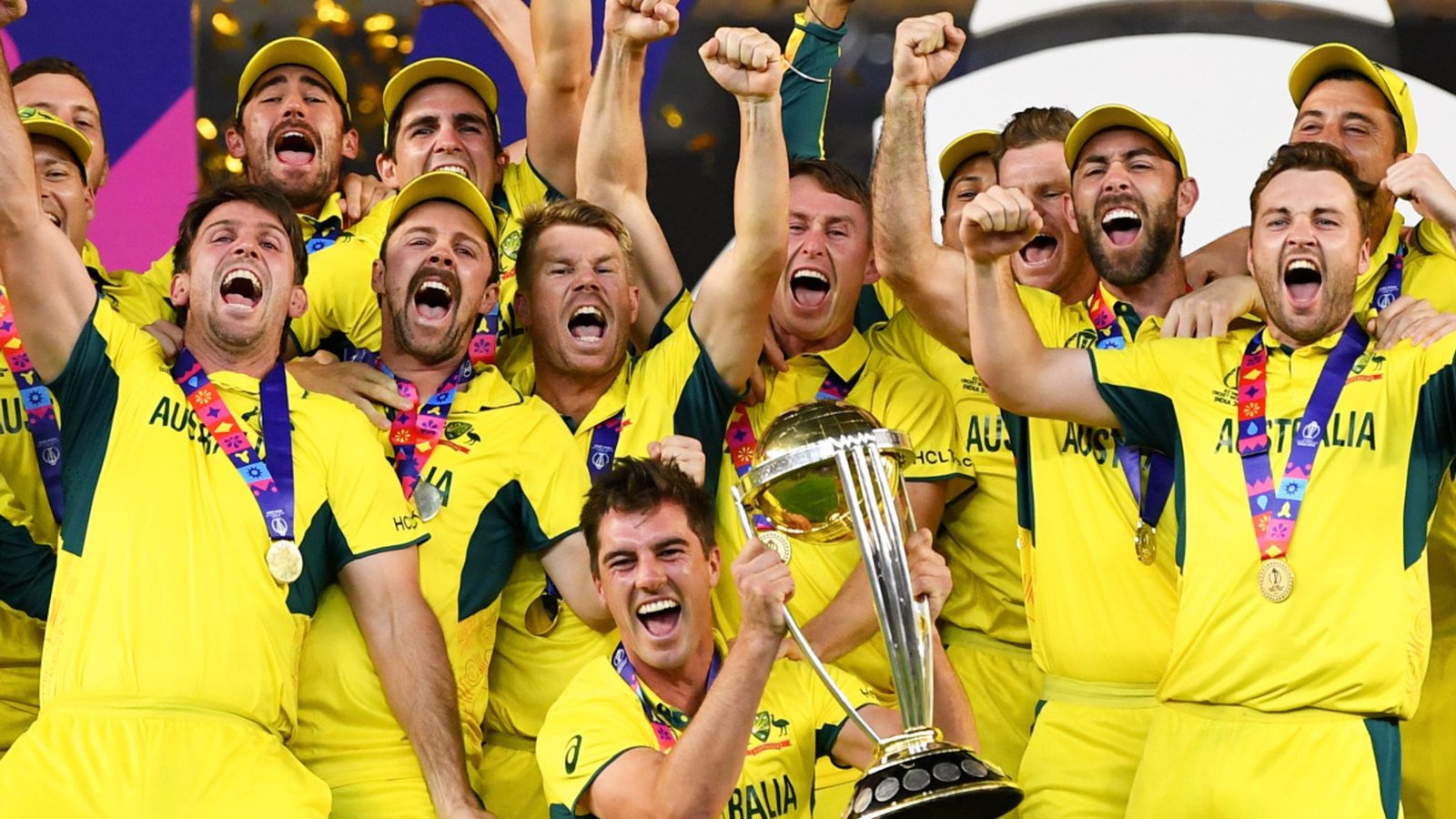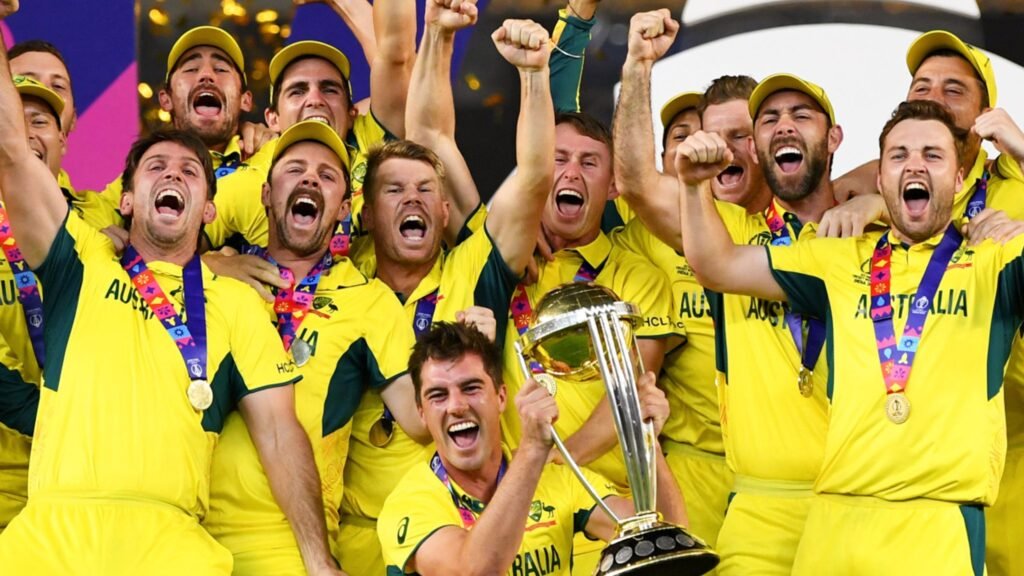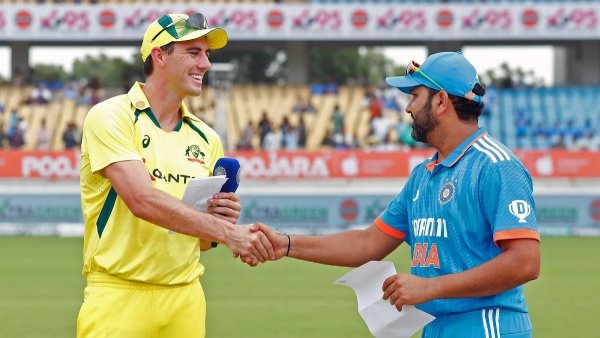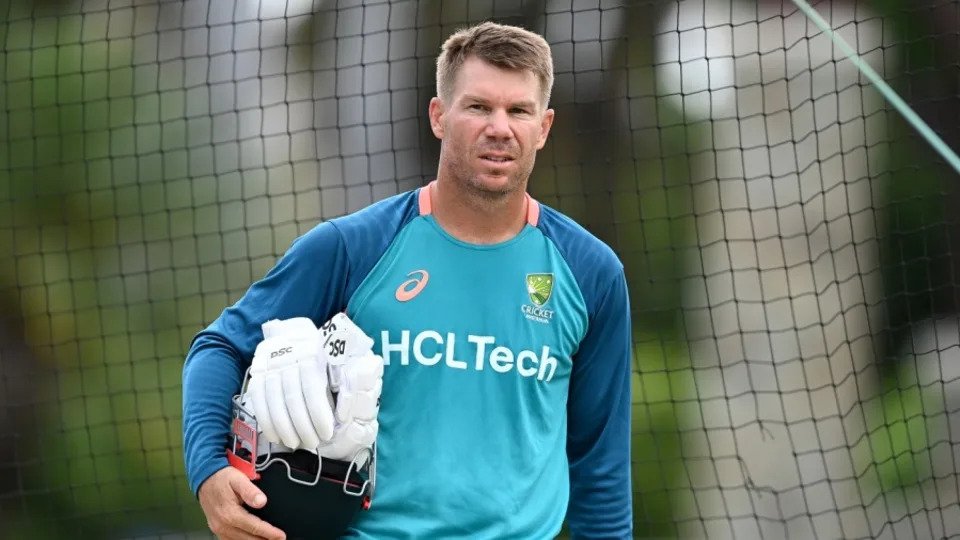
In the exhilarating saga of the 2023 Cricket World Cup, Australia once again showcased their prowess, securing their sixth title in eight appearances at the tournament’s pinnacle.

The Australia squad will exit their dressing room and head to the center long after the spectators have left the stadium following a World Cup final. Once there, there are a few speeches, shouts, and chants. In that instant of victory, players are releasing things out of their system, letting the others know exactly how they are feeling.
They practically always follow this practice; it is who they are. Although the fans aren’t around to witness this event, reporters who are wrapping up their final stories have seen them do it frequently. Frequently, as not many cricket teams in the world can win as much or as consistently as Australia.

Winning Legacy
They won the ODI World Cup for the first time in 1987 (India), and then again in 1999 (England), 2003 (South Africa), 2007 (West Indies), 2015 (Australia), and now again in 2023 (India). The why this team wins all around the world is because, as Steve Smith stated on Sunday night, “Australia typically plays well in those (big) moments.”
The World Cup for men’s cricket in 2023 will mark the first time since 2007 that a host country has not won the competition. One may argue that the conditions weren’t what Australia is used to. However, like they nearly usually do, they found a way on a sluggish wicket.
Seizing the Moment
Everyone was aware of the fact that India would not have an easy time in the final after Pat Cummins and Mitchell Starc worked together to help Australia defeat South Africa in their semi-final on yet another slow surface.
India was experiencing the kind of winning run that captivates a country. However, Australia is Australia. On important days, they know how to get out of bed on the correct side. And it was evident from the outset in Ahmedabad.
In a final, they decided to chase instead of putting runs on the board, defying the advice of many. Apparently, the pressure of pursuing can be scary. But none of that mattered to Australia. They supported that choice with the kind of desperate fielding and bowling that befits challengers rather than seasoned victors.
The way Travis Head sprinted back from cover, dove, and held on to a catch with the ball coming over his shoulder during the day’s tenth over is the moment that most embodied that attribute. It put an end to Rohit Sharma’s 47 off 31 balls and greatly boosted Australia. Australia prevailed in that instant.
“I think we saved our best for the last, some big match players stood up,” Cummins remarked. “We were in a grave situation. Everything began last week with South Africa.”
“You just can’t wait,” he continued. Sometimes you have be bold and go for the kill. Furthermore, the team showed complete buy-in.”

Poor Start: Steady Comeback
However, the event didn’t look simple at all to start. To begin with, the squad’s quality was questioned after two straight losses. However, they retaliated, improving and ultimately outsmarting, India in all formats in the championship game.
Numerous things may have gone wrong. Adam Zampa, their lone specialist spinner, had a mishap in a swimming pool and was sick before the competition started. However, both he and Australia recovered.
Before Head could play in the tournament’s opening match, a fracture needed to heal. When he finally had a chance to play New Zealand, he made a century to herald his arrival. The icing on the cake is the performance in the final.
Josh Hazlewood, a pacer, stated, “We were basically knocking on wood the whole tournament.”
They didn’t have to worry, according to some. They had already advanced to seven finals and won five of them before traveling to Ahmedabad. When they need it, they muster some bravery and find a way.

Familiar Way of Winning
“Most of the time, teams exaggerate the significance of a big moment in knockout games rather than the importance of a big game,” former Australia captain Aaron Finch told ESPNCricinfo just before the semifinal. “The strength of Australia over the years has been to simplify the game plan, the mentality and what you need to do as an individual.”
“You think about the opposition so much—who will bat and who will bowl—and it consumes a lot of mental energy,” he continued. Calming everything down and concentrating on the essentials is, I believe, one of the skills. You can put up with that if something happens that day and someone pulls a blinder. Getting beaten is acceptable. Beating yourself up is the last thing you should do. Individual performances follow naturally from it since your thoughts are so clear.”
Nobody will argue that this is simple, but after winning the ODI World Cup, retaining the Ashes, and winning the World Test, it’s safe to conclude that Australia has excelled.





